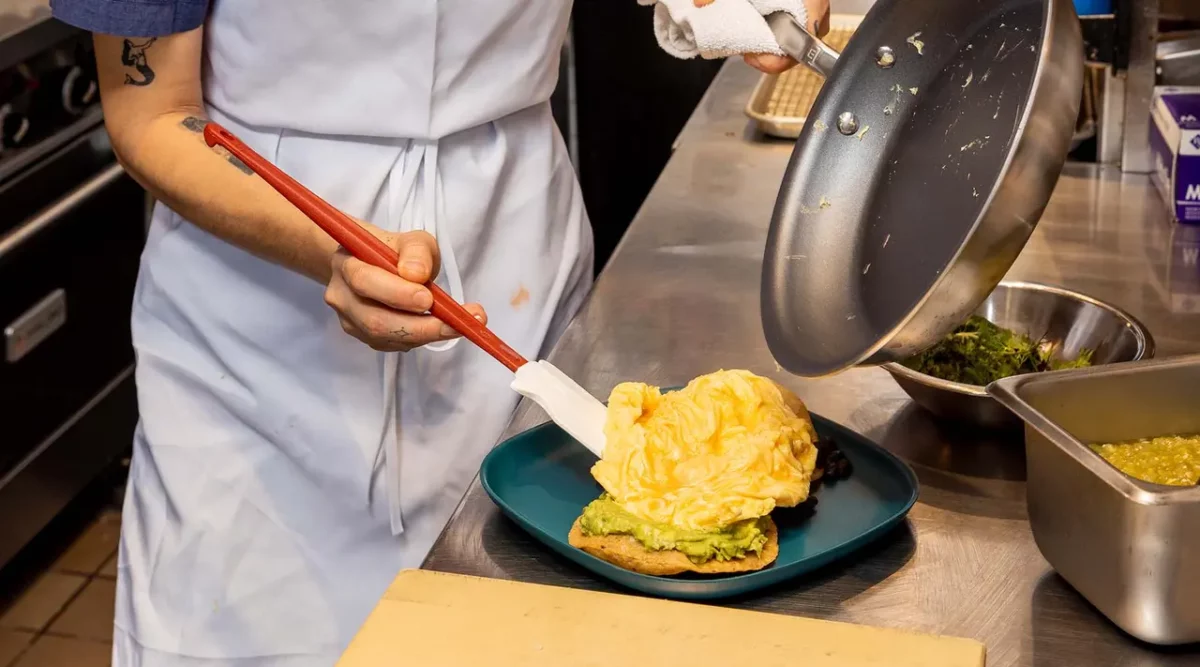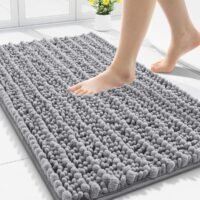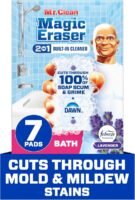Chefs do not typically use nonstick pans in professional kitchens.
Why Do Chefs Avoid Nonstick Pans?
Most chefs avoid using nonstick pans because they cannot withstand the demands of a professional kitchen. Nonstick pans are less durable than stainless steel or cast iron, which can handle high heat and repeated use without scratching or losing their nonstick properties.
Nonstick Pans In Professional Kitchens
Nonstick pans have become a common sight in many home kitchens. They offer convenience and ease of use, allowing easy cooking and cleanup. However, when it comes to professional kitchens, chefs often avoid using nonstick pans. But why is that?
Chef’s Preference For Steel And Cast Iron
Chefs steer clear of nonstick pans because they prefer materials like steel and cast iron. In a professional kitchen’s fast-paced, high-heat environment, nonstick pans can be unreliable. They may be unable to withstand the intense heat and rigorous use that chefs put them through daily.
On the other hand, steel and cast iron pans are known for their durability and heat retention. Chefs rely on these materials to provide consistent, even heating and superior searing abilities. These pans can handle the demands of a professional kitchen, making them the go-to choice for many chefs.
Nonstick Pans Can Be Fragile
Another reason chefs avoid nonstick pans is their fragility. Nonstick coatings can be prone to chipping, scratching, and wearing off over time. In a busy kitchen where pans are frequently used and washed, this can become a problem.
The concern is that even the most minor scratches or chips in the nonstick coating can release toxic chemicals into cooked food. To ensure the safety of their customers, chefs prioritize using cookware that doesn’t have this risk. Steel and cast-iron pans provide a reliable and safe cooking surface without potentially harmful nonstick coatings.
In conclusion, while nonstick pans have their place in home kitchens, professional chefs often choose to avoid them. The preference for steel and cast iron, their durability, heat retention capabilities, and the potential risk of nonstick coatings make them less suitable for the demands of a bustling restaurant kitchen. Chefs continue to rely on tried-and-true materials that can withstand the heat and pressure of their craft.
The Best Pans For Professional Chefs
When choosing the best pans for professional chefs, various factors come into play. One of the critical considerations is the material of the pan. Different materials offer different benefits and are preferred for different types of cooking. This article will explore three popular materials professional chefs use for their pans: stainless steel, cast iron, and other preferred materials.
Stainless Steel Pans
Stainless steel pans are a staple in professional kitchens due to their durability and versatility. These pans are ideal for searing, frying, and browning as they distribute heat evenly and maintain high heat retention. The smooth and non-reactive surface of stainless steel pans also makes them easy to clean and resistant to stains.
Key Features of Stainless Steel Pans:
- Durable and long-lasting
- Excellent heat conductivity
- Non-reactive and easy to clean
- It offers a sleek and professional look
Cast Iron Pans
Cast iron pans have been used for centuries by professional chefs and are known for their excellent heat retention and even heat distribution. These pans are ideal for slow cooking, braising, and baking. The Al-seasoned cast iron pan’s naturally nonstick surface allows easy food release and creates a beautiful sear.
Key Features of Cast Iron Pans:
- Superb heat retention and even heat distribution
- Natural, nonstick surface
- Durable and versatile
- It can be used on various heat sources, including induction
Other Preferred Materials
While stainless steel and cast iron are the go-to choices for many professional chefs, other preferred materials are gaining popularity in the culinary world. These materials include copper, carbon steel, and nonstick pans with specialized coatings such as ceramic or titanium.
Key Features of Other Preferred Materials:
- Copper: Excellent heat conductivity and precise temperature control
- Carbon Steel: Lightweight and responsive to temperature changes
- Nonstick pans with specialized coatings: Easy food release and minimal oil usage
Ultimately, the best pans for professional chefs depend on personal preferences and the cooking they specialize in. Investing in high-quality pans that suit individual cooking styles, offer durability, and provide excellent heat distribution is essential. By choosing the suitable pans, professional chefs can elevate their culinary creations and achieve outstanding results in the kitchen.
Chef Recommendations And Tips
Gordon Ramsay, renowned chef, cooking show host, and restaurateur, has collaborated to create the HexClad range, which he claims are some of the best nonstick pans he has ever cooked with. Ramsay said, “I use the pans at home, and the combination of stainless steel and nonstick functionality is amazing.” His endorsement of these pants speaks volumes about their quality and reliability.
To avoid food sticking to your pans while cooking, there are a few helpful tips you can follow:
- Ensure the pan is preheated correctly before adding any ingredients. A hot pan will create a nonstick surface.
- Use enough oil or fat to create a thin layer on the pan’s surface. This will help prevent food from sticking.
- Allow the food to cook without disturbing it too much. Moving or flipping the food frequently can cause it to stick.
- If using a nonstick pan, avoid using metal utensils that could scratch the coating. Instead, opt for wooden or silicone utensils.
- Regularly clean your pans to remove any leftover residue that may cause food to stick.
By following these tips, you can ensure that your food cooks evenly and doesn’t stick to the pan, making your cooking experience much more enjoyable!
While nonstick pans are popular and widely used, alternatives are available for those who prefer different cooking surfaces. Some popular options include:
| Cast Iron: | A classic choice for many chefs, cast iron pans have natural nonstick properties and are incredibly durable. |
| Stainless Steel: | Stainless steel pans are versatile and can be used for various cooking techniques. You can create a nonstick cooking surface by using proper cooking techniques, such as preheating the pan and using enough oil to |
| ceramic: | Ceramic pans have a nonstick coating free of PFOA and PTFE chemicals. They provide excellent heat distribution and are easy to clean. |
These alternatives offer different cooking experiences and can be great options depending on your preferences and style.

Credit: www.everten.com.au
Frequently Asked Questions: Do Chefs Use Nonstick Pans?
Does Gordon Ramsay use nonstick pans?
Chef Gordon Ramsay uses nonstick pans in his kitchen and has even collaborated to create the HexClad range, which he considers some of the best nonstick pans he’s cooked with. The combination of stainless steel and nonstick functionality makes these pans unique for him.
Why do chefs use metal on nonstick?
Chefs use metal on nonstick pans because they need durable cookware that can withstand high heat and repeated use. Nonstick coatings can be delicate and may not hold up well in a professional kitchen setting. Steel and cast-iron pans are preferred by chefs for their durability and versatility.
Should I stop using nonstick pans?
No, most professional chefs do not use nonstick pans. They prefer stainless steel or cast iron pans because they can withstand high heat and are more durable. Nonstick pans can become less effective over time and may release toxic fumes at high temperatures.
How Do Chefs Keep Food From Sticking?
Chefs keep food from sticking by using enough oil to create a thin layer of fat on the cooking surface. This, combined with heat and time, prevents sticking without needing nonstick pans. Most professional chefs do not use nonstick cookware.
Conclusion
Overall, it’s clear that chefs have varied preferences when it comes to using nonstick pans. While some chefs may opt for the durability and versatility of stainless steel or cast iron pans, others may find nonstick pans useful for specific tasks in the kitchen.
Ultimately, the choice depends on the individual chef’s cooking style and needs. Whether you’re a professional chef or a home cook, selecting the correct pan that suits your cooking techniques allows you to quickly create delicious meals.

Hi, I’m Esrat, and I’m so glad that you found me here at Happy Food Kitchen! I started Happy Food Kitchen in 2023 to have a creative, right-brained outlet to balance my very left-brained career in genetics.






